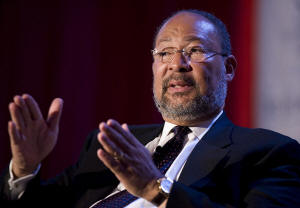Richard Parsons, prominent Black executive who led Time Warner and
Citigroup, dies at 76
 Send a link to a friend
Send a link to a friend
 [December 27, 2024] By
ANICK JESDANUN and MICHAEL R. SISAK [December 27, 2024] By
ANICK JESDANUN and MICHAEL R. SISAK
NEW YORK (AP) — Richard Parsons, one of corporate America's most
prominent Black executives who held top posts at Time Warner and
Citigroup, died Thursday. He was 76.
Parsons, who died at his Manhattan home, was diagnosed with multiple
myeloma in 2015 and cited “unanticipated complications” from the disease
for cutting back on work a few years later.
The financial services company Lazard, where Parsons was a longtime
board member, confirmed his death.
Parsons’ friend Ronald Lauder told The New York Times that the cause of
death was cancer.
Parsons stepped down Dec. 3 from the boards of Lazard and Lauder’s
company, Estée Lauder, citing health reasons. He had been on Estée
Lauder’s board for 25 years.
“Dick was an American original, a colossus bestriding the worlds of
business, media, culture, philanthropy, and beyond,” Ronald Lauder said
in a statement on behalf of the Lauder family.
David Zaslav, the CEO of Time Warner successor Warner Bros. Discovery,
hailed Parsons as a “great mentor and friend” and a “tough and brilliant
negotiator, always looking to create something where both sides win.”
“All who got a chance to work with him and know him saw that unusual
combination of great leadership with integrity and kindness,” Zaslav
said, calling him “one of the great problem solvers this industry has
ever seen.”

Parsons, a Brooklyn native who started college at 16, built a track
record of steering big companies through tough times.
He returned Citigroup to profitability after turmoil from the global
financial crisis and helped restore Time Warner after its much-maligned
acquisition by internet provider America Online.
Parsons was named to the board of CBS in September 2018 but resigned a
month later because of illness.
Parsons said in a statement at the time that he was already dealing with
multiple myeloma when he joined the board, but “unanticipated
complications have created additional new challenges.” He said his
doctors advised him to cut back on his commitments to ensure recovery.
“Dick’s storied career embodied the finest traditions of American
business leadership,” Lazard said in a statement. The company, where
Parsons was a board member from 2012 until this month, praised his
“unmistakable intelligence and his irresistible warmth.”
“Dick was more than an iconic leader in Lazard’s history — he was a
testament to how wisdom, warmth, and unwavering judgment could shape not
just companies, but people’s lives,” the company said. “His legacy lives
on in the countless leaders he counseled, the institutions he renewed,
and the doors he opened for others.”
Parsons was known as a skilled negotiator, a diplomat and a crisis
manager.
Although he was with Time Warner through its difficulties with AOL, he
earned respect for the company and rebuilt its relations with Wall
Street. He streamlined Time Warner’s structure, pared debt and sold
Warner Music Group and a book publishing division.
He also fended off a challenge from activist investor Carl Icahn in 2006
to break up the company and helped Time Warner reach settlements with
investors and regulators over questionable accounting practices at AOL.
Parsons joined Time Warner as president in 1995 after serving as
chairman and chief executive of Dime Bancorp Inc., one of the largest
U.S. thrift institutions.
[to top of second column] |

Richard Parsons, Chairman of Citigroup, speaks at Time Warner's
headquarters Monday, June 15, 2009 in New York. (AP Photo/Mark
Lennihan, File)
 In 2001, after AOL used its fortunes
as the leading provider of Internet access in the U.S. to buy Time
Warner for $106 billion in stock, Parsons became co-chief operating
officer with AOL executive Robert Pittman. In that role, he was in
charge of the company’s content businesses, including movie studios
and recorded music.
He became CEO in 2002 with the retirement of Gerald Levin, one of
the key architects of that merger. Parsons was named Time Warner
chairman the following year, replacing AOL founder Steve Case, who
had also championed the combination.
The newly formed company’s Internet division quickly became a drag
on Time Warner. The promised synergies between traditional and new
media never materialized. AOL began seeing a reduction in
subscribers in 2002 as Americans replaced dial-up connections with
broadband from cable TV and phone companies.
Parsons stepped down as CEO in 2007 and as chairman in 2008. A year
later AOL split from Time Warner and began trading as a separate
company, following years of struggles to reinvent itself as a
business focused on advertising and content. Time Warner is now
owned by AT&T Inc.
A board member of Citigroup and its predecessor, Citibank, since
1996, Parsons was named chairman in 2009 at a time of turmoil for
the financial institution. Citigroup had suffered five straight
quarters of losses and received $45 billion in government aid. Its
board had been criticized for allowing the bank to invest so heavily
in the risky housing market.
Citigroup returned to profit under Parsons, starting in 2010, and
would not have a quarterly loss again until the fourth quarter of
2017. Parsons retired from that job in 2012.
In 2014 he stepped in as interim CEO of the NBA's Los Angeles
Clippers until Microsoft CEO Steve Ballmer took over later that
year.
“Dick Parsons was a brilliant and transformational leader and a
giant of the media industry who led with integrity and never shied
away from a challenge,” NBA Commissioner Adam Silver said.
Parsons, a Republican, previously worked as a lawyer for Nelson
Rockefeller, a former Republican governor of New York, and in Gerald
Ford’s White House. Those early stints gave him grounding in
politics and negotiations. He also was an economic adviser on
President Barack Obama’s transition team.

Parsons, whose love of jazz led to co-owning a Harlem jazz club,
also served as Chairman of the Apollo Theater and the Jazz
Foundation of America. And he held positions on the boards of the
Smithsonian National Museum of African American History and Culture,
the American Museum of Natural History and the Museum of Modern Art
in New York City.
Parsons played basketball at the University of Hawaii at Manoa and
received his law degree from Albany Law School in 1971. He is
survived by his wife, Laura, and their family.
All contents © copyright 2024 Associated Press. All rights reserved |